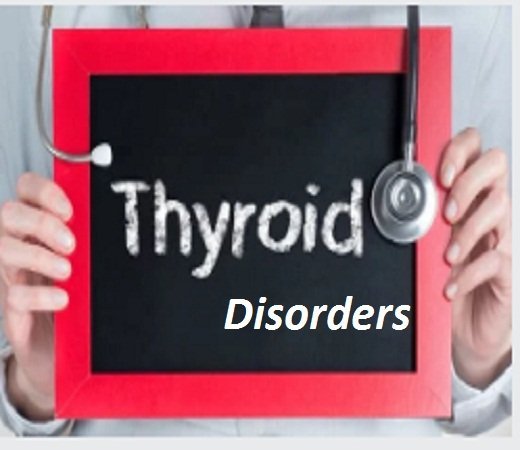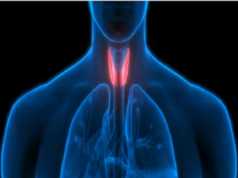Our body is a working network, just a slight change or alteration in any of the processes will reshape the body system and make things work unusually. The same principle applies to thyroid disorder, a condition that changes the physiology of the body and put it in an uncomfortable state. Thyroid disorders are a condition that affects the thyroid gland and changes its functionality. Being a butterfly-shaped gland, the thyroid gland is located at the forefront of the neck, right below the Adam apple. It has a special attachment called Isthmus which serves as a tract that helps connect the thyroid lobes at both ends.
This gland primarily helps to regulate the metabolic processes of the body and release hormones that are of high importance to the body system. The most important of them all is thyroxine which is synthesized using iodine.
Unlike other glands in the body system, the thyroid gland is under the control of the hypothalamus, a section of the brain that secretes thyrotropin-releasing hormone (TRH) and thyroid-stimulating hormone (TSH. Both hormones work in coordination to trigger the release of thyroxine when needed by the body.
The fact that the activities of the thyroid gland itself are controlled by the hypothalamus in conjunction with the pituitary gland, a slight change in any of these issues could result in a disorder and cause damaging effects on the thyroid gland.
To buttress this, right here we will be taking you through the type of thyroid disorders that have been diagnosed so far, thyroid symptoms and cure, causes of each disorder, and their respective treatments.
Types of Thyroid Disorders:
There are five major types of thyroid disorders. These includes:
- Hypothyroidism
- Hyperthyroidism
- Goiter
- Thyroid nodules
- Thyroid cancer
Having shared this, let’s take a look at each of these disorders, their symptoms, and respective causes.
- Hypothyroidism:
This is a special type of thyroid disorder that is caused by insufficient production of thyroid hormones. This disorder has nothing to do with the thyroid gland itself. It is caused by the irregularities of some activities that take place within the pituitary gland and hypothalamus. Here are some of the basic symptoms of hyperthyroidism that you can easily identify without further diagnosis.
- Continuous and excessive fatigue
- Mental fogginess and poor level of concentration
- Constipation, dry layer of skin, cold, and constipation
- Joint and muscle aches
- Women suffering from hypothyroidism usually do have prolonged menstrual cycle and excessive bleeding than usual
Causes of hypothyroidism:
Hypothyroidism is an autoimmune disorder that leads to the inflammation of the thyroid gland. It is caused by some irregular defects in the hypothalamus, thyroidand pituitary glands. These defects usually bring about thyroid hormone resistance and thyroid imbalance. Thereby reducing the number of hormones been released to the body system.
- Hyperthyroidism:
This particular disorder is the exact opposite of hyperthyroidism. Here, excess thyroid hormone is released into the body system. This, in turn, increases the metabolism rate of the body system. In health disorders like this, the patient will showcase several symptoms that are related to increased metabolism. Here are some of the common symptoms of hyperthyroidism that are quite obvious.
- Increased heart rate, tremors, and fatigue
- Nervousness, increased bowel movement, profuse sweating
- Consistent loss in weight, zero tolerance to heat, concentration problem
Causes of Hyperthyroidism:
Several things could be responsible for hyperthyroidism disorder. However, some are quite common. Examples of these are; Graves’ disease, thyroid nodules, and Toxic multinodular goiter. Throughout many research, it has also been discovered that excessive consumption of iodine could also be responsible for hyperthyroidism.
- Goiter:
This particular disorder expresses itself externally. Goiter is a special type of thyroid disorder with an enlargement along the neck region. This disease could either be attributed to normal thyroid malfunctioning, or even the more specific disorders such as hypothyroidism and hyperthyroidism.
- Thyroid nodules:
Thyroid nodules are an abnormal growth of lumps around the thyroid gland. In most thyroid nodules cases, are usually caused by a benign tumor or cysts. Although, there are reports that the development of thyroid nodules around the thyroid gland indicates the development of thyroid cancer. Nonetheless, thyroid nodules can be cured if the necessary treatment measures are taken at an early stage.
What Is The Treatment For Thyroid Disorders?
When it comes to treating thyroid disorder, there are several ways to go about it. Thyroid disorder can be treated either by medication or surgery.
Thyroid medications:
In cases whereby a patient is suffering from insufficient levels of thyroid hormones in the body, which is usually associated with hypothyroidism, thyroid supplements are administered to such a patient. The oral supplement usually contains synthesized thyroid hormones. With this, the deficiency will be taken care of and there will be a balance in the body system. There are so many thyroid supplements in the market but vita balance thyroid support is best thyroid supplement.
For hyperthyroidism, oral medications are also to help reduce the quantity of the thyroid hormones in the body system and also decrease their production. Also, to help cater to the other symptoms of hyperthyroidism such as increased heart rate, other medications are administered alongside the oral dose earlier stated.
Peradventure, the administered dose wasn’t able to control the excess production of thyroid hormones, another option is to perform a radioactive ablation. In simple terms, this involves administering radioactive iodine. With this, you will be able to get rid of the unnecessary thyroid tissues.
Thyroid surgery:
When it comes to treating large goiter and nodules that are hyperfunctioning, you need more than just simple medications. To get the best, what you need to do is to go for surgery. With this, you will be able to treat yourself and set up your body system the right way and most especially take care of the thyroid effects in females.







